Myanmar trying to protect all citizens: Suu Kyi
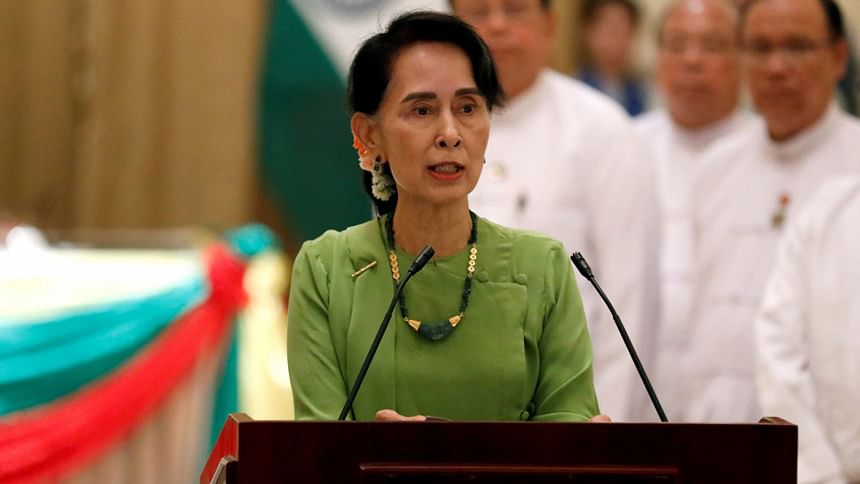
Myanmar leader Aung San Suu Kyi said on Thursday her government was doing its best to protect everyone in the strife-torn state of Rakhine, as the estimated number of Rohingya Muslims who have fled to Bangladesh leapt by 18,000 in one day, to 164,000.
Suu Kyi did not refer specifically to the exodus of the minority Rohingya, which was sparked by insurgent attacks on Aug. 25 and an army counter-offensive, but said her administration was trying its best to take care of all citizens.
Western critics have accused Suu Kyi of not speaking out for the Rohingya, some 1.1 million people who have long complained of persecution and are seen by many in Buddhist-majority Myanmar as Bangladeshis. Some have called for the Nobel Peace Prize she won in 1991 as a champion of democracy to be revoked.
"We have to take care of our citizens, we have to take care of everybody who is in our country, whether or not they are our citizens," Suu Kyi said in comments to Reuters Television's Indian partner, Asian News International.
"Of course, our resources are not as complete and adequate as we would like them to be but, still, we try our best and we want to make sure that everyone is entitled to the protection of the law," she said during a visit by Indian Prime Narendra Modi to Yangon.
Suu Kyi on Tuesday blamed "terrorists" for "a huge iceberg of misinformation" on the strife in the northwestern state of Rakhine but made no mention of the Rohingya who have fled.
She has come under increasing pressure from countries with Muslim populations, and this week U.N. Security Council Secretary-General Antonio Guterres warned there was a risk of ethnic cleansing in Myanmar that could destabilise the region.
Myanmar has said it is negotiating with China and Russia to ensure they block any Security Council censure over the crisis.
Suu Kyi said the situation in Rakhine has been difficult for many decades and so it was "a little unreasonable" to expect her administration, which has been in power for only 18 months, to have resolved it already.
EXODUS COULD REACH 300,000
Myanmar says its forces are fighting a legitimate campaign against terrorists responsible for a string of attacks on the police and army since last October. Officials blame Rohingya militants for killing non-Muslims and burning their homes.
However, rights monitors and Rohingya fleeing to Bangladesh say the Myanmar army is trying to force them out with a campaign of arson and killings.
Boatloads of exhausted Rohingya continued to arrive in the Cox's Bazar region of neighbouring Bangladesh.
At least 12 people were missing after a wooden boat loaded with refugees capsized early on Thursday, survivors told Reuters journalists in Cox's Bazar. More than 30 bodies have washed up over the past week after boats capsized, officials say.
The latest estimates by UN workers operating in the region show arrivals in just 13 days stood at 164,000, up from 146,000 the day before.
UN officials in Bangladesh now estimate that the total number of refugees from Myanmar since Aug. 25 could reach up to 300,000, said Dipayan Bhattacharyya, who is Bangladesh spokesman for the World Food Programme (WFP).
The surge of refugees - many sick or wounded - has strained the resources of aid agencies and communities already helping hundreds of thousands of victims of previous spasms of violence in Myanmar. Many have no shelter, and aid agencies are racing to provide clean water, sanitation and food.
"Many refugees are stranded in no-man's land between the border with Myanmar," Medical charity Medecins Sans Frontieres (MSF) said in a statement.
"Even prior to the most recent influx, many Rohingya refugees in Bangladesh lived in unsafe, overcrowded and unhygienic conditions, with little protection from the elements."
It said more nurses, midwives and doctors had been brought in to tackle violence-related injuries, severely infected wounds and obstetric complications.

 For all latest news, follow The Daily Star's Google News channel.
For all latest news, follow The Daily Star's Google News channel. 

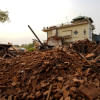

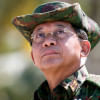
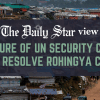
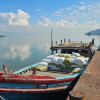


Comments